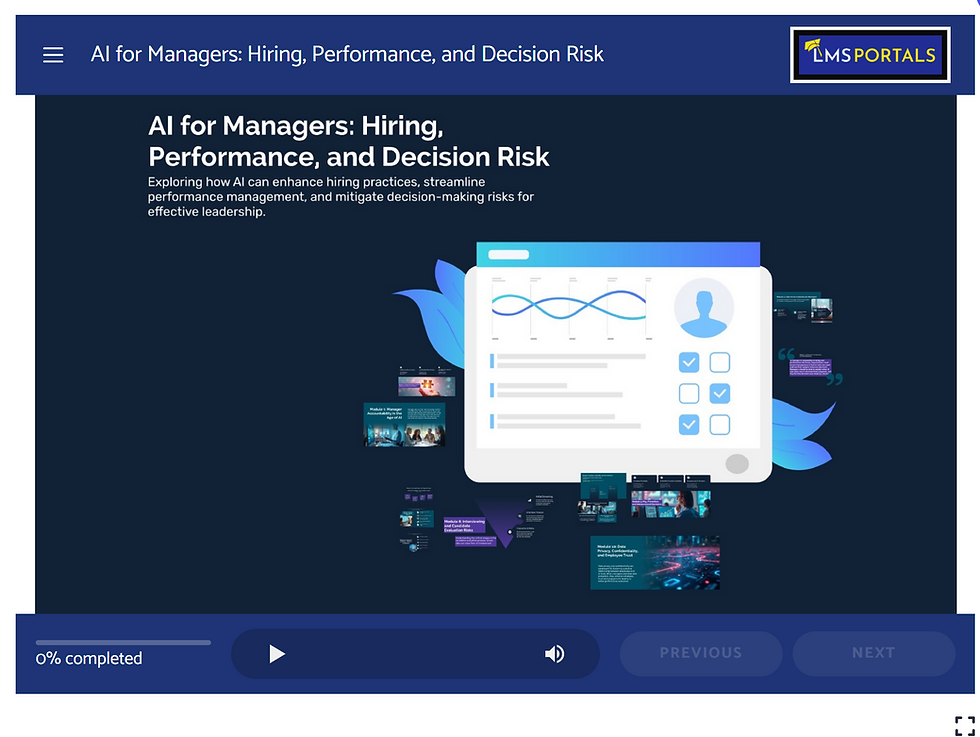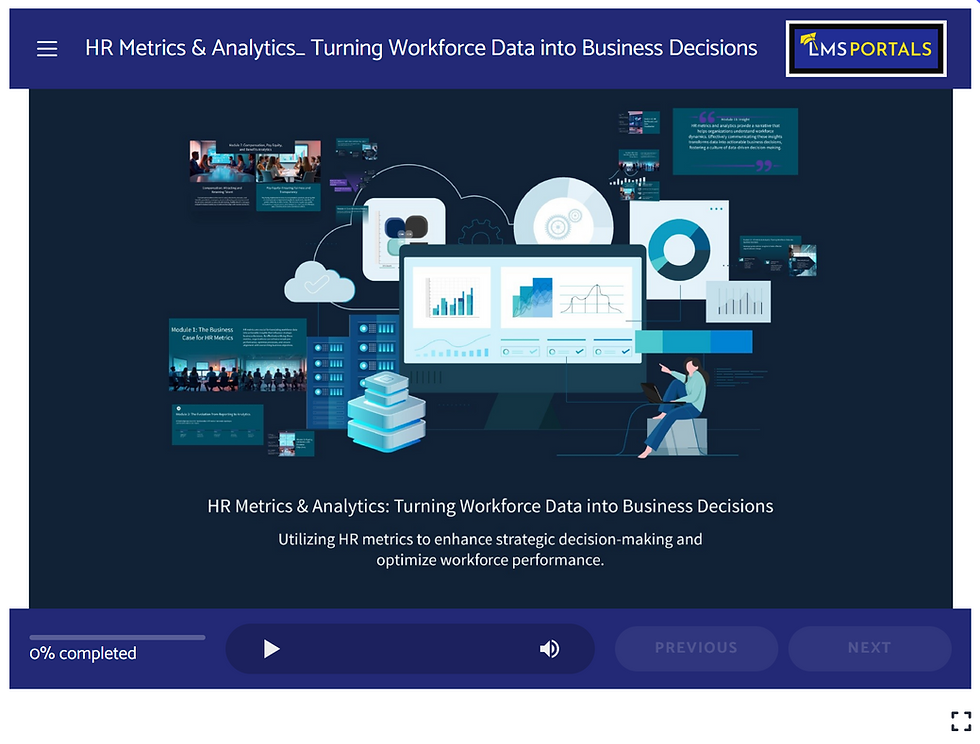The Role of HR Consultants in Enhancing Employee Engagement and Retention
- LMSPortals

- Sep 27, 2024
- 7 min read

Employee engagement and retention are two of the most pressing challenges organizations face today. A disengaged workforce can lead to lower productivity, decreased morale, and higher turnover rates. On the other hand, retaining engaged employees boosts innovation, profitability, and company culture.
This is where HR consultants play a vital role in helping companies foster an environment conducive to both engagement and long-term retention.
Understanding Employee Engagement and Retention
Before exploring the role of HR consultants, it’s important to define the terms. Employee engagement refers to the emotional commitment employees have toward their organization. It goes beyond satisfaction and focuses on the willingness to go the extra mile. Retention, on the other hand, is the ability of an organization to keep its employees over time, minimizing turnover.
The Expertise of HR Consultants
HR consultants bring specialized knowledge and objectivity to a company’s human resources practices. Their primary objective is to improve HR functions, making them more efficient, effective, and aligned with business goals. They assess existing employee engagement levels, turnover rates, and the reasons behind employee dissatisfaction. This data-driven approach allows HR consultants to craft personalized strategies tailored to a company’s specific needs.
How HR Consultants Enhance Employee Engagement
Creating Meaningful Employee Development Programs HR consultants help organizations build robust training and development programs that align employees' career aspirations with company goals. Offering opportunities for skill advancement and personal growth fosters engagement by ensuring employees feel valued and invested in.
Implementing Employee Feedback Mechanisms Regular employee feedback surveys and interviews are powerful tools HR consultants use to measure engagement. These mechanisms give employees a voice, allowing them to express concerns and provide suggestions for improvement. HR consultants analyze this feedback to address any gaps in leadership, work culture, or communication.
Developing a Positive Work Culture A positive workplace culture is the foundation of employee engagement. HR consultants work with leadership teams to align company values and behaviors, fostering inclusivity, collaboration, and transparency. They can implement policies that promote work-life balance, employee recognition programs, and team-building activities.
Improving Leadership Practices Effective leadership is key to employee engagement. HR consultants often provide leadership training, coaching, and workshops to improve communication, empathy, and management skills among leaders. This ensures that employees feel supported and heard, which is essential to building trust and engagement.
How HR Consultants Boost Employee Retention
Conducting Exit Interviews and Analyzing Turnover Trends HR consultants can provide valuable insights into why employees leave through comprehensive exit interviews and turnover trend analysis. By understanding the root causes of turnover, HR consultants can develop strategies to address them and reduce attrition.
Designing Competitive Compensation and Benefits Packages One of the primary reasons employees leave is dissatisfaction with compensation and benefits. HR consultants help organizations evaluate their pay structures, benchmarking them against industry standards. They also recommend tailored benefits packages that cater to employees' needs, improving satisfaction and retention.
Implementing Career Pathing and Succession Planning Career stagnation is a key driver of turnover. HR consultants assist in developing clear career paths for employees and implementing succession planning to ensure employees see long-term growth opportunities. By creating visible opportunities for advancement, organizations can reduce turnover and retain top talent.
Fostering Employee Well-being Employee well-being is critical for retention. HR consultants implement wellness programs that focus on physical and mental health, offering resources such as stress management workshops, fitness programs, and counseling services. These initiatives show employees that the company cares about their well-being, boosting loyalty and retention.
Case Study: A Successful Engagement and Retention Strategy
Consider a mid-sized tech company that was struggling with high turnover and disengaged employees. After hiring an HR consultant, they implemented several changes:
Launched a feedback program to better understand employee frustrations.
Developed a comprehensive employee development plan, offering workshops, certifications, and mentoring.
Improved the work environment by offering flexible working hours and remote work options.
Within a year, the company saw a 25% improvement in employee engagement scores and a significant decrease in turnover rates. The company’s investment in its people, facilitated by the HR consultant’s guidance, led to higher productivity and profitability.
HR consultants play a pivotal role in enhancing both employee engagement and retention. By providing expert advice and tailored strategies, they help organizations create a positive work environment, align leadership practices, and address the needs of their employees. In today’s competitive job market, the ability to engage and retain talent is critical to long-term business success, and HR consultants provide the expertise necessary to achieve these goals.
How HR Consultants Can Utilize eLearning to Drive Employee Engagement and Retention
Employee disengagement can lead to high turnover rates, loss of talent, and reduced productivity. To combat these challenges, HR consultants are turning to eLearning as an effective tool to boost employee engagement and retention. eLearning offers flexibility, personalization, and continuous development, making it an ideal solution for creating a workforce that is both engaged and loyal.
The Role of eLearning in Modern Workplaces
eLearning refers to the use of digital platforms to deliver educational content and training programs. Unlike traditional training, eLearning allows employees to access learning materials from anywhere, at any time, and at their own pace. This flexibility caters to the modern workforce's needs, particularly in hybrid and remote work environments.
HR consultants can leverage eLearning to help companies design and implement training programs that not only develop employees' skills but also foster a culture of continuous learning, contributing to both engagement and retention.
How eLearning Enhances Employee Engagement
Personalized Learning Paths One of the major benefits of eLearning is its ability to provide personalized learning paths based on an employee’s role, skills, and career aspirations. HR consultants can work with organizations to assess each employee's needs and create customized learning experiences. This ensures employees are engaged with content that is relevant to their individual growth, making learning more meaningful.
Interactive and Engaging Content eLearning platforms often offer interactive elements such as quizzes, gamification, and simulations that make learning more engaging. HR consultants can help design content that incorporates these features to keep employees actively involved. Gamification, for instance, encourages friendly competition and rewards, motivating employees to complete courses and learn new skills.
On-Demand Learning Flexibility is key in maintaining employee engagement. With eLearning, employees can access training materials when it suits them, allowing them to balance professional development with their day-to-day responsibilities. HR consultants can help organizations implement an on-demand learning approach, where employees can complete courses without interrupting their workflow, leading to higher engagement and satisfaction.
Encouraging Collaboration Through Social Learning Many eLearning platforms offer social learning features, such as discussion forums, peer reviews, and group assignments. HR consultants can recommend the use of social learning tools to encourage collaboration and knowledge sharing among employees. This builds a sense of community and connection within the workforce, increasing engagement and enhancing team cohesion.
Continuous Feedback and Recognition Regular feedback is essential for employee engagement. eLearning platforms allow for real-time feedback on quizzes and assignments, helping employees understand their progress and areas for improvement. HR consultants can integrate feedback loops into eLearning programs to keep employees motivated. Additionally, recognition badges and certificates for completed courses can further boost engagement by acknowledging employees' efforts and achievements.
How eLearning Supports Employee Retention
Career Development and Skill Growth A lack of career advancement opportunities is one of the leading causes of employee turnover. eLearning provides a scalable way for employees to continuously develop new skills and advance in their careers. HR consultants can design career development plans that include eLearning modules tailored to employees' career goals, ensuring that employees see a clear path for growth within the company.
Cost-Effective and Scalable Training Traditional in-person training can be costly and time-consuming, especially for large organizations with distributed workforces. eLearning allows companies to provide consistent training across locations at a lower cost. HR consultants can help organizations build scalable eLearning programs that allow employees to grow professionally without burdening the company's budget, making it easier to invest in long-term employee development.
Fostering a Learning Culture Companies that prioritize learning and development often experience higher employee retention. eLearning allows organizations to create a culture of continuous improvement and growth. HR consultants can develop strategies to incorporate eLearning into the company’s long-term goals, showing employees that the organization is invested in their success and well-being, leading to greater loyalty and retention.
Addressing Skill Gaps and Preparing for the Future HR consultants can use eLearning to address critical skill gaps within an organization. By implementing targeted training programs, they can help employees build the skills necessary to adapt to changing industry trends or evolving roles. When employees feel prepared and confident in their abilities, they are more likely to stay with the company rather than seeking opportunities elsewhere.
Supporting Employee Well-being Employee well-being is closely linked to retention. eLearning can include wellness programs that focus on mental health, stress management, and work-life balance. HR consultants can work with companies to design wellness courses that employees can access as part of their professional development. Supporting employees holistically fosters a sense of care and belonging, encouraging long-term retention.
Key Considerations for HR Consultants When Implementing eLearning
Choosing the Right Platform HR consultants need to guide organizations in selecting an eLearning platform that aligns with their needs. Factors such as user experience, mobile accessibility, integration with HR systems, and content creation capabilities should be considered to ensure the platform meets both engagement and retention goals.
Measuring Success Tracking the success of eLearning programs is crucial. HR consultants should establish key performance indicators (KPIs) such as course completion rates, employee satisfaction, and skills gained. These metrics provide insights into the effectiveness of the eLearning strategy and allow for adjustments as needed to ensure ongoing success.
Promoting eLearning as Part of Company Culture HR consultants should work with leadership teams to position eLearning as a core element of the company’s culture. This involves consistent communication, incentives for participation, and leadership buy-in. When eLearning is seen as an integral part of the organization’s development, employees are more likely to engage with it regularly.
Summary
HR consultants can leverage eLearning to create tailored, flexible, and engaging training programs that improve employee engagement and retention. By offering personalized learning paths, fostering collaboration, and supporting career development, eLearning helps employees stay engaged and invested in their roles.
Additionally, eLearning provides organizations with a cost-effective and scalable way to build a workforce that is prepared for future challenges, increasing retention and long-term success.
About LMS Portals
At LMS Portals, we provide our clients and partners with a SaaS-based, multi-tenant learning management system that allows you to launch a dedicated training environment (a portal) for each of your unique audiences.
The system includes built-in, SCORM-compliant rapid course development software that provides a drag and drop engine to enable most anyone to build engaging courses quickly and easily.
We also offer a complete library of ready-made courses, covering most every aspect of corporate training and employee development.
If you choose to, you can create Learning Paths to deliver courses in a logical progression and add structure to your training program. The system also supports Virtual Instructor-Led Training (VILT) and provides tools for social learning.
Together, these features make the LMS Portals platform the ideal SaaS-based platform for our HR Consulting partners.
Contact us today to get started or visit our Partner Program pages



Comments